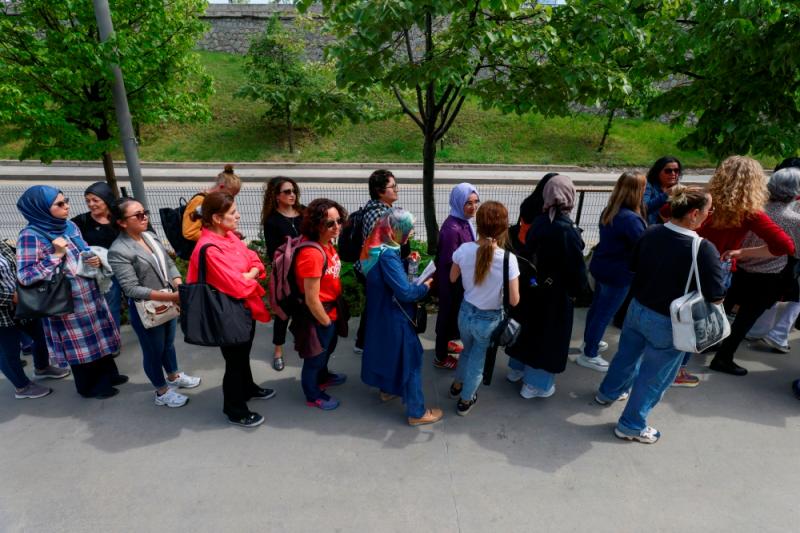ISTANBUL: Mehmet Ali Fakioglu was made homeless by an earthquake that hit Turkey in February, but made a 15-hour journey back to the disaster zone to vote today, recalling the fear he felt when the catastrophe struck and his anger that help was slow to come.
Fakioglu, who has been staying with his son in Istanbul since leaving his home in the Antakya region, remembers the earthquake every day - the moment he ran from his apartment with his wife and daughter as walls banged and cracked.
Fakioglu, 56, declined to say how he voted on Sunday in an election that is seen as the toughest political test yet for President Tayyip Erdogan. But as he prepared to cast his ballot, he voiced criticism of the state’s slow response to the disaster in which more than 50,000 people were killed.
Alongside a spiralling cost-of-living crisis, the Feb. 6 earthquake and its aftermath has loomed over the campaign. Opinion polls have shown the opposition narrowly ahead of Erdogan, though there is little evidence that the earthquake has changed how people will vote in the presidential and parliamentary election.
Fakioglu is one of hundreds of thousands of people made homeless by the earthquake, many of whom returned home to vote on Sunday.
“I will only say this, everybody should vote with their conscience at the ballot box. We were forgotten, all of us, on that day, the second day even on the third day. Not only in Antakya, but people were forgotten in all those cities,” Fakioglu said, referring to the late arrival of help.
“People all around Turkey should keep this in mind when voting.”
Critics and earthquake survivors have accused Erdogan’s government of both a slow response and lax enforcement of building rules - failures they said cost lives.
Erdogan said in the days after the quake that the response of the search and rescue teams was not as fast as it could have been. The government said the majority of the collapsed buildings were built before new construction regulations were in place.
Helping people travel home
Political parties - including Erdogan’s AK Party - municipalities, and non-governmental organisations have been helping voters to get home in order to cast their ballots from their old registered addresses, providing free transportation.
Oy ve Otesi, an NGO promoting democratic participation, said a scheme it backed to help voters get home for election day had provided 30,000 bus tickets since late April.
“People are interested, people want to go back to vote ... Most of them didn’t register new addresses so they will have to go back,” said Ertim Orkun, chairman of Oy ve Otesi.
He said around 1.5 million people had left the quake zone, only a portion of whom had registered new addresses for the purpose of voting.
Since some school buildings where voting would normally take place were damaged by the earthquake, polling stations have been set up in containers and tents in the affected area.
Boarding a bus from Istanbul to the province of Hatay in the southeast on Saturday, Kivanc Girisken said he would vote for Erdogan’s main challenger, Kemal Kilicdaroglu.
Girisken, 21, said he and his family had spent three weeks in a tent after the quake.
“This election was important even before the earthquake, but this made it even more crucial. When voting, we will take into account the pain we went through and the delay in the government response,” Girisken said. — Reuters
Oy ve Otesi, an NGO promoting democratic participation, said a scheme it backed to help voters get home for election day had provided 30,000 bus tickets since late April.
“People are interested, people want to go back to vote ... Most of them didn’t register new addresses so they will have to go back,” said Ertim Orkun, chairman of Oy ve Otesi.
He said around 1.5 million people had left the quake zone, only a portion of whom had registered new addresses for the purpose of voting.
Since some school buildings where voting would normally take place were damaged by the earthquake, polling stations have been set up in containers and tents in the affected area.
Boarding a bus from Istanbul to the province of Hatay in the southeast on Saturday, Kivanc Girisken said he would vote for Erdogan’s main challenger, Kemal Kilicdaroglu
Girisken, 21, said he and his family had spent three weeks in a tent after the quake.
“This election was important even before the earthquake, but this made it even more crucial. When voting, we will take into account the pain we went through and the delay in the government response,” Girisken said. — Reuters










